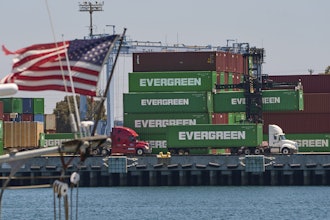
LONDON (AP) — Britain's Parliament gets another chance Monday to offer a way forward on Britain's stalled divorce from the European Union, holding a series of votes on Brexit alternatives in an attempt to find the elusive idea that can command a majority.
With just 12 days until the U.K. must come up with a new plan or crash out of the bloc, the House of Commons was considering a variety of options. Two ideas — staying in the EU customs union or holding a second referendum on Brexit — have emerged as the most likely plans to succeed.
Both those ideas have been rejected by British Prime Minister Theresa May. But the divorce deal she negotiated with the EU has been rejected by Parliament three times, leaving Britain less than two weeks from a chaotic no-deal Brexit.
May has not given up on her deal, which was rejected by Parliament on Friday by a 58-vote margin — its narrowest defeat yet, but still substantial. She could try to bring the agreement back for a fourth time later this week.
May's spokesman, James Slack, said the prime minister "believes there is a majority in the House for leaving in an orderly way with a deal," and her agreement was the best on offer.
Slack rejected speculation that the government could take drastic actions, such as asking Queen Elizabeth II to suspend Parliament or getting her to refuse to sign legislation.
"We don't have any intention of involving the queen in this process," he said.
Monday's votes in Parliament follow an earlier round last week in which none of the eight Brexit options on offer secured a majority.
Staying in the EU customs union or holding a new Brexit referendum were on the table Monday, along with other "soft Brexit" alternatives and a call for a no-deal Brexit in which Britain leaves the EU without a deal on April 12.
The range of choices, and lack of consensus, reflect a Parliament and a government deeply divided over how — and whether — to leave the EU.
Justice Secretary David Gauke said leaving the bloc without a deal was "not the responsible thing for a government to do."
But his Cabinet colleague Liza Truss said it would be better than a soft Brexit.
"I think that we are well prepared for no deal," Truss, who is chief secretary to the Treasury, told the BBC. "I don't have any fear of no deal."
May has less than two weeks to bridge the hostile divide that separates those who want to sever links with the EU and those who want to keep the ties that have bound Britain to the bloc for almost 50 years.
If the government can't bridge the gap by April 12, Britain will crash out of the EU without a plan for future relations, damaging its economy, undermining the country's unity and diminishing its stature in the world.
With the stakes building, the second guessing on May's strategy is intensifying.
In an extremely unusual move, Chief Whip Julian Smith, whose job is to ensure that Conservative Party lawmakers vote for government-backed policies, told the BBC the government should have told people they would have to accept a softer form of leaving the EU after May lost her majority in the 2017 general election.
Once weakened, Smith said, May "should have just been clearer the consequences of that, the parliamentary arithmetic, would mean that this would be inevitably a kind of softer type of Brexit."






















